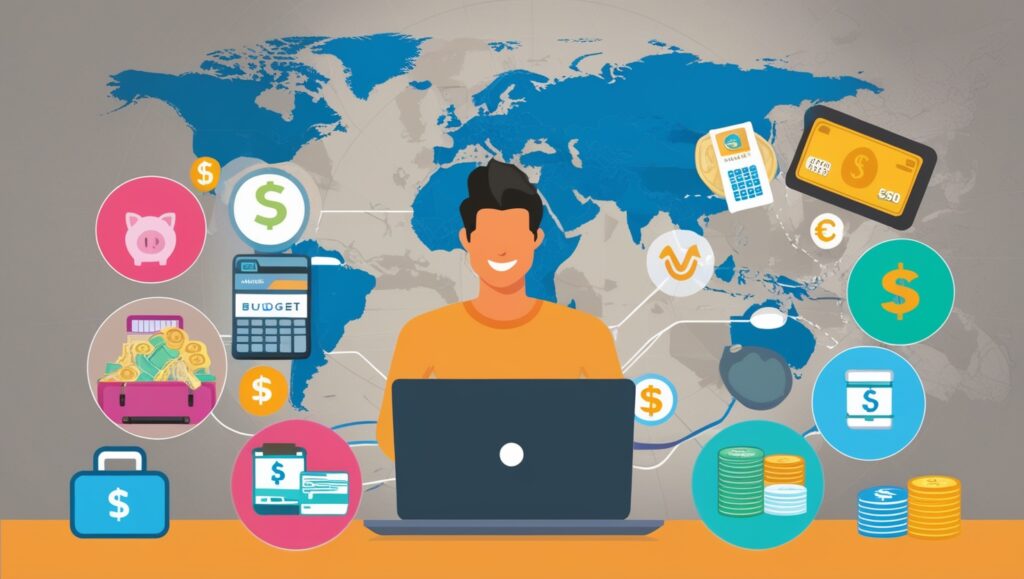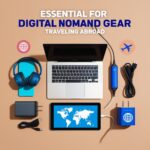Tips for Managing Finances as a Digital Nomad
Tips for Managing Finances as a Digital Nomad: Living a digital nomad lifestyle brings the freedom to travel and work from anywhere in the world. However, managing finances while on the move can be challenging without proper planning. Here are some useful tips to help digital nomads manage their finances effectively, ensuring a smooth and sustainable lifestyle.
1. Create a Budget
Budgeting is a fundamental step for any digital nomad. Start by calculating your expected monthly expenses, including accommodation, food, transportation, insurance, and leisure activities. Setting a budget helps you keep track of your spending and avoid overspending. Use budgeting apps to monitor your expenses and make adjustments as needed.
SEO Tip: Incorporate keywords like “budgeting for digital nomads” and “travel expenses planning” for better search rankings.
2. Save for Emergencies
It’s essential to have a financial safety net while living a nomadic lifestyle. Save at least three to six months’ worth of living expenses in an emergency fund. This fund can cover unexpected costs, such as medical emergencies, travel disruptions, or loss of work. Having an emergency fund provides peace of mind and keeps you financially secure.
SEO Tip: Use phrases like “emergency fund for digital nomads” and “saving tips for travelers” to attract readers seeking financial security advice.
3. Use a Multi-Currency Account
A multi-currency account allows you to hold, receive, and transfer money in different currencies without incurring high conversion fees. This is especially useful if you work with clients or companies in different countries. Services like Wise (formerly TransferWise) and Revolut offer multi-currency accounts that help you manage foreign currency transactions efficiently.
SEO Tip: Target terms such as “multi-currency accounts for travelers” and “best banking options for digital nomads” for improved search visibility.
4. Minimize Transaction Fees
Foreign transaction fees and ATM charges can quickly add up when you’re traveling. Look for banks or credit cards that offer low or no foreign transaction fees. Additionally, use ATMs that are part of a global network to avoid extra charges. Some digital banks reimburse ATM fees, making them a smart choice for digital nomads.
SEO Tip: Include keywords like “low-fee travel banking” and “avoid foreign transaction fees” to optimize the article for search engines.
5. Track Income and Expenses
Keep a record of your income and expenses to get a clear picture of your financial health. Use accounting software like QuickBooks, FreshBooks, or free alternatives like Wave to manage your finances. Regularly tracking your financial activities helps you stay within budget and identify areas where you can cut costs.
SEO Tip: Use phrases such as “tracking expenses for digital nomads” and “financial management tools for freelancers” for better SEO.
6. Invest in Travel Insurance
Travel insurance is crucial for covering unexpected expenses, such as medical emergencies, lost baggage, or canceled flights. Many travel insurance plans offer coverage tailored to digital nomads, including extended trips and remote work policies. Make sure to read the terms and conditions carefully to understand what is covered.
SEO Tip: Incorporate keywords like “best travel insurance for digital nomads” and “insurance tips for travelers” for enhanced search engine performance.
7. Set Up Automatic Savings
Automating your savings can help you reach your financial goals more easily. Set up automatic transfers from your checking account to a savings or investment account each month. Even small amounts can add up over time, providing you with a cushion for future travel or unexpected expenses.
SEO Tip: Target terms like “automatic savings for digital nomads” and “saving strategies while traveling” to help readers interested in financial planning.
8. Optimize Your Taxes
Taxes can be complicated for digital nomads, as different countries have varying tax rules. Research tax laws in your home country and any other countries where you plan to stay for an extended period. Consider working with a tax professional who understands the complexities of taxes for digital nomads to ensure compliance and take advantage of any available tax benefits.
SEO Tip: Use phrases such as “tax advice for digital nomads” and “remote worker tax optimization” to attract readers seeking tax guidance.
9. Consider Passive Income Streams
Diversifying your income with passive income streams, such as affiliate marketing, online courses, or stock photography, can help you stay financially stable. Passive income reduces reliance on client work, providing additional security and freeing up more time for travel.
SEO Tip: Include keywords like “passive income for digital nomads” and “diversify income streams while traveling” to improve search rankings.
10. Plan for Retirement
Even though retirement may seem far away, it’s essential to plan for it. Contribute to retirement accounts like IRAs, 401(k)s, or international equivalents. You can also invest in stocks, bonds, or real estate to build a retirement fund. Consistently saving for retirement will ensure long-term financial stability.
SEO Tip: Use phrases such as “retirement planning for digital nomads” and “long-term savings for travelers” to cater to readers interested in future financial security.
Conclusion
Managing finances as a digital nomad requires careful planning, budgeting, and a proactive approach. By setting a budget, tracking expenses, minimizing fees, and saving for emergencies, you can maintain financial stability while enjoying the freedom to work from anywhere. Investing in travel insurance, optimizing taxes, and building passive income streams can further enhance your financial well-being. Follow these tips to manage your finances effectively and enjoy a sustainable digital nomad lifestyle.
See More


